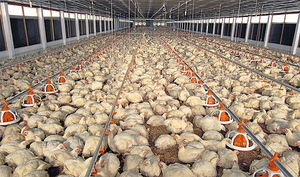Note from GRAIN: Why might a dominant agribusiness company need to pay for positive press?
Thai-based Charoen Pokphand – CP is not explicitly named as the subject of TCIJ's report, though the company felt the need to respond to the report in the Bangkok Post article – is one of the world's leading meat suppliers. Its operations extend across producing animal feed, breeding and farming livestock, to meat processing, restaurants and retail.
But CP's business model has been heavily criticised – the role of its battery poultries in incubating disease and its ambitious promotion of hybrid rice are notable examples; most recently news of the use of slave labour in producing cheap feed for its farmed prawns emerged.
CP's model also leaves very little room for the small farmers who've long been the bedrock of meat and poultry production – they are bypassed or pushed into contract farming arrangements in which the company dictates everyting: input, production processes, quality controls and price.
Read this 2012 interview for a glimpse at how the rise of CP and similar industrial meat producers is undermining food sovereignty in Thailand and elsewhere

The monthly payments by the firm with integrated operations in the farm and poultry businesses were made to 19 individuals or media organisations including organisers of programmes on radio stations, magazines, newspaper offices, websites and other platforms, the TCIJ said, citing the firm's document leaked to it.
The monthly payments were more than 1.73 million baht a month including 90,000 baht each to two newspaper staff and 50,000 baht to another.
The money was categorised as a "special budget to support the media'', it added.
The payments were part of the company's public relations and corporate communication plan last year.
The TCIJ did not name the company in the report but showed some documents on its website with all names of the press and media organisations painted in black apparently to avoid libelous consequences.
It said the evidence was meeting minutes of the company, which is a dominant domestic player and main exporter. They were obtained from sources who could not be unveiled, the TCIJ said.
The report also revealed the firm's tactics to convince or influence the media and social networks so that they stop or drop reports and comments which could put the company in a negative light. They include personal connections with journalists, formal business contacts and even meetings with executives of the media organisations.
Academics were brought in to write articles to counter news reports affecting its businesses including stories about high egg prices or slumping pork prices, it added.
The TCIJ is an independent, non-profit media organisation set up as another source of information for the public besides mainstream media to promote the public's right to information and investigative reports.
In the wake of the TCIJ report, Charoen Pokphand Foods (CPF) on Monday clarified that the listed company had not spent money to influence the media and never contacted the media on any report with information considered negative to the firm.
"We strongly affirm that we have never paid the media to block reports or distort facts in news stories,'' Punninee Nanthapanich, CPF's senior vice-president in charge of communication and public relations, said in a statement.
Mrs Punninee admitted the firm had close contacts with the media and the company set aside a budget for the press.
But the process was accountable and transparent, she said, adding the budget included financial support on activities of the press such as fund-raising golf events and seminars.
The National Press Council of Thailand and the News Broadcasting Council of Thailand issued a statement Monday evening, saying they had set up an independent committee chaired by Klanarong Chantik, a former anti-corruption commissioner and comprising experts and outsiders to investigate into the accusations.
"The disclosure of the documents also violates the privacy of media professionals as it shows the work status, residences, attitudes, working methods and lifestyles of the persons in question which should not be relevant to normal working practices," it said.